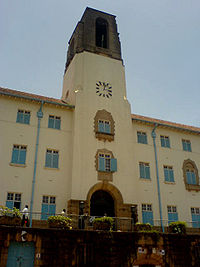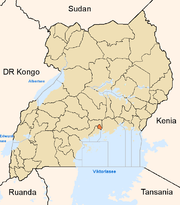- Makerere University
-
Makerere University Kampala (MUK) 
Makerere University clock towerMotto We Build for the Future Established 1922 Type Public Vice-Chancellor Venansius Baryamureeba Students 40,000 Location Kampala, Uganda Campus Urban Website http://www.mak.ac.ug Makerere University (MAK), Uganda's largest and second-oldest higher institution of learning, (the oldest is Katigondo National Major Seminary in Masaka District, which was established in 1911), was first established as a technical school in 1922. In 1963 it became the University of East Africa, offering courses leading to general degrees from the University of London. It became an independent national university in 1970 when the University of East Africa was split into three independent universities: University of Nairobi (Kenya), University of Dar es Salaam (Tanzania) and Makerere University. Today, Makerere University has 22 faculties, institutes and schools offering programmes for about 30,000 undergraduates and 3,000 postgraduates.
Makerere was home to many post-independence African leaders, including former Ugandan president Milton Obote and late Tanzanian president Julius Nyerere. Former Tanzanian president Benjamin Mkapa and current Kenyan president Mwai Kibaki are also Makerere alumni.
In the years immediately after Uganda's independence, Makerere University was a focal point for the literary activity that was central to African nationalist culture. Some prominent writers, including Nuruddin Farah, Ali Mazrui, David Rubadiri, Okello Oculi, Ngũgĩ wa Thiong'o, John Ruganda, Paul Theroux, V. S. Naipaul and Peter Nazareth, were at Makerere University at one point in their writing and academic careers.
In September 2011, the university announced that it would close indefinitely following a week-long strike by the lecturers who refused resume work until their demands were met.[1]
Contents
Notable former and current faculty and administrators
- Hugh Dinwiddy, lecturer in literature, Warden of Northcote Hall
- Mahmood Mamdani, political scientist and historian
- Ali Mazrui, academic, historian and political scientist
- Apolo Nsibambi, former Prime Minister of Uganda and former Chancellor of Makerere University
- Joe Oloka-Onyango, former Dean of Law and human rights expert
- Okot p'Bitek, poet
- Sylvia Tamale, lawyer, academic, women's rights activist
- Ngugi wa Thiongo, novelist[citation needed]
- Timothy Wangusa, author, poet, one time minister of education
- John L. Ziegler, former Director of Uganda Cancer Institute, current Professor in Residence Emeritus at UCSF[2]
- Ssenteza Kajubi, A two time Vice Chancellor, Educationist
- Jude Ssebuwufu, a renown Chemist,Vice Chancellor to remember
- Livingstone Luboobi, mathematician, former Dean of Faculty of Science and Vice Chancellor
- Venansius Baryamureeba, current Vice Chancellor
- George Kirya, microbiologist, diplomat, academic, former Vice Chancellor at Makerere; current Chairman of Uganda Health Services Commission
- Vincent A Ssembatya, mathematician, former Dean of Faculty of Science, current Director of Quality Assurance of Makerere University
Notable alumni
Political figures and Government employees
- Godfrey Binaisa, former President of Uganda
- Professor Gilbert Bukenya Balibaseka, Former Vice-President of Uganda
- Julius Nyerere, Tanzanian politician and the first President of Tanzania
- Kanyama Chiume, Malawian activist for independence of Nyasaland (now Malawi)
- Daphrosa Gahakwa, Rwandan Education Minister
- Joseph Kabila, Congolese politician and President of the Democratic Republic of the Congo
- Specioza Kazibwe, former Vice President of the Republic of Uganda
- Mwai Kibaki, Kenyan Politician and President of Kenya
- Charles Kikonyogo, former Governor, Bank of Botswana,and former Governor, Bank of Uganda
- Samson Kisekka, former Vice President of Uganda
- Henry Kyemba, Minister of Health under Idi Amin[3]
- Benedicto Kiwanuka, first Prime Minister and first Chief Justice of Uganda
- Yusuf Lule, former President of Uganda
- Benjamin Mkapa, Tanzanian politician and former President of Tanzania
- Ssentongo J.B.M., former Vice Chairman DP-USA and First Chief Ambassador, Ugandan North American Association.
- Emmanuel Tumusiime-Mutebile, Governor, Bank of Uganda
- Sir Frederick Muteesa II, former Kabaka of Buganda and first President of Uganda
- Apolo Nsibambi, Prime Minister of Uganda and former Chancellor of Makerere University
- Oginga Odinga, Kenyan Politician and first Vice President of Kenya
- Milton Obote, two-time former President of Uganda
- Ruhakana Rugunda, Physician and Permanent representative of Uganda to the United Nations
- Kizza Besigye, Physician, Retired Colonel in the UPDF, Opposition politician, Leader of the Forum for Democratic Change party, former presidential candidate 2001 and 2006.
- Crispus Kiyonga, Physician, Minister of Defense of Uganda
Sportspeople
- Henry Osinde - Ugandan born Cricketer currently Canadian fast bowler.
Writers and journalists
- Micere Githae Mugo Kenyan Novelist, Post, Activist
- Giles Muhame, journalist
- Michael Nsimbi, "Father of Ganda literature"
- John Nagenda, writer, political commentator and adviser to the president of Uganda, Mr.Yoweri Museveni
- Peter Nazareth, author, critic
- Okello Oculi, author, poet
- Charles Onyango-Obbo, journalist and political commentator
- Okot p'Bitek, poet
- David Rubadiri, Malawian poet, novelist, diplomat
- Jameela Siddiqi, novelist, broadcaster, journalist
- Ngugi wa Thiongo, Kenyan novelist
- Timothy Wangusa, author, poet, one time minister of education
Others
- Kay Amin, a wife of Idi Amin
- John David Barton, vice president for academic affairs at Rochester College, Rochester, Michigan, USA
- Keko - Rapper and Musician
- Matthew Lukwiya, physician in Gulu during the 2000 Ebola outbreak
- Patrick Mazimhaka, Deputy Chairperson of the African Union's African Commission
- Andrew Mwenda, the Managing Director of the "Independent" Newspaper in Uganda
- Harry Nkumbula, a leader during Zambia's struggle for independence
- Olara Otunnu, former United Nations Under-Secretary General and Special Representative for Children and Armed Conflict
- John Sentamu, the Anglican Archbishop of York, England, the first black Archbishop Church of England
- Martin Ssempa - controversial Ugandan pastor and AIDS activist
- Peter Takirambudde, Executive Director of Human Rights Watch for sub-Saharan Africa
- Aggrey Kiyingi, World renowned Consultant Cardiologist and philanthropist, Sydney Australia
Halls of residence
The original eight halls of residence are:
- For men
- Livingstone Hall
- Lumumba Hall
- Mitchell Hall
- Nkrumah Hall
- Nsibirwa Hall
- University Hall
- For women
- Africa Hall
- Mary Stuart Hall
Other halls that have been added include:
- For Women
- Complex Hall(CCE)
- For Medicine Students in their final years
- Galloway
Ranking
In 2010, according to University Ranking by Academic Performance (URAP), Makerere University is the best university in Uganda and the 736th best university in the world.[4]
Upcountry campuses
In January 2010, the university announced the opening of two new campuses, one in the city of Fort Portal, approximately 311 kilometres (193 mi), by road, west of Kampala, and another one in the city of Jinja, approximately 86 kilometres (53 mi), by road, east of Kampala. The following courses will be offered at the upcountry campuses: [5]
- Eastern Campus, Jinja
- Bachelor of Science in Computer Science
- Bachelor of Information Technology (BIT)
- Bachelor of Law
- Bachelor of Development Studies
- Bachelor of Tourism
- Western Campus, Fort Portal
- Bachelor of Commerce (B.Com)
- Bachelor of Business Administration
- Bachelor of Science in Surveying
- Bachelor of Science in Land Economics
- Bachelor of Science in Conceptual Economics
- Bachelor of Science in Business Statistics.
See also
- African Writers Conference
- East African Geographical Review
- African Geographical Review
- List of universities in Uganda
- Makerere University College of Health Sciences
References
- ^ http://www.independent.co.ug/ugandatalks/2011/09/makerere-university-closed-over-lecturers-strike/?Itemid=410
- ^ http://cancer.ucsf.edu/people/ziegler_john.php
- ^ Kyemba, Henry. A State of Blood, p. 21
- ^ "URAP - University Ranking by Academic Performance". http://www.urapcenter.org/2010.
- ^ Makerere Opens New Campuses
External links
- Website of Makerere University
- Faculty of Computing and Information Technology
- Directorate of Quality Assurance
- Makerere University Africa and World Rankings at Webometrics.info
Coordinates: 00°21′00″N 32°34′03″E / 0.35°N 32.5675°E
Kampala District Capital: Kampala Divisions Neighborhoods Bugoloobi · Bukoto · Busega · Butabika · Bwaise · Ggaba · Kabalagala · Kamwookya · Kansanga · Kaleerwe · Kanyanya · Kasubi · Katwe · Kawaala · Kawempe · Kibuli · Kibuye · Kigoowa · Kikaaya · Kisaasi · Kiwaatule · Kulambiro · Kololo · Kyambogo · Kyebando · Lubaga · Lungujja · Luzira · Makerere · Makindye · Mbuya · Mengo · Mpererwe · Mulago · Munyonyo · Mutundwe · Muyenga · Naakulabye · Naguru · Najjanankumbi · Nakasero · Nakawa · Namirembe · Namungoona · Namuwongo · Nateete · Ndeeba · Nsambya · Ntinda · Old Kampala · Port Bell · Wandegeya 
Economy Air Uganda · Aya Group · Quality Chemical Industries Limited · Mukwano Group · Ruparelia Group · Bank of Uganda · ABC Capital Bank · Bank of Africa · Bank of Baroda · Barclays Bank · DFCU Group · Cairo International Bank · Centenary Bank · Citibank · Crane Bank · DFCU Bank · Diamond Trust Bank · Ecobank · Equity Bank · Fina Bank · Global Trust Bank · Housing Finance Bank · Imperial Bank Uganda · Kenya Commercial Bank · National Bank of Commerce · Orient Bank · PostBank Uganda · Stanbic Bank · Standard Chartered Bank · Tropical Bank · United Bank for Africa · East African Development Bank · Uganda Development Bank · National Housing and Construction Company · Uganda Air Cargo · International Medical Group · National Social Security Fund · Umeme · Uganda Securities Exchange · Uganda Investment Authority · Capital Markets Authority · The Monitor · New Vision · New Vision Group · Uganda Telecom · Mercantile Credit Bank · Pride Microfinance Limited · Uganda Finance Trust Limited · Opportunity Uganda Limited · Kyagalanyi Coffee Limited · FINCA Uganda Limited · UGAFODE Microfinance LimitedNotable
landmarksBulange · Uganda Parliament Buildings · Butabika National Referral Hospital · Mulago Hospital Complex · Nsambya Hospital · Rubaga Hospital · Mengo Hospital · International Hospital Kampala · Kibuli Hospital · Kampala Capital City Authority Complex · Kampala Serena Hotel · Hotel Africana · Kampala Sheraton Hotel · Imperial Hotels Group · Imperial Royale Hotel · Grand Imperial Hotel · Hotel Equatoria · Kampala Hilton Hotel · Kampala Intercontinental Hotel · Kampala Speke Hotel · East African Development Bank Building · Bank of Uganda Building Complex · Mengo Palace · St. Paul's Cathedral Namirembe · St. Mary's Cathedral Lubaga · Makerere University Main Campus · Kibuli Mosque · Old Kampala Mosque · Kampala Airport · Uganda Museum · Uganda National Cultural Centre · Kampala Northern Bypass Highway · Kampala-Jinja Highway · Kasubi Tombs · Roman Catholic Archdiocese of KampalaEducation Makerere University · Makerere University Business School · Kampala International University · Kampala University · Kyambogo University · Law Development Centre · International Health Sciences University · International University of East Africa · Makerere College School · Rubaga Community School · Saint Lawrence University · Uganda Management Institute · Cavendish University Uganda · Victoria University UgandaNotable people Apolo Nsibambi · Nasser Ntege Sebaggala · David Serwadda · Fred Ruhindi · John Ssebaana Kizito · Bulaimu Muwanga Kibirige · Erias Lukwago · Dr. Ian Clarke · Jennifer Musisi · Maria Kiwanuka · Laurence Sematimba · Joseph Kizito · Justinian Tamusuza · Robert Ssejjemba · Eugene Sseppuya · Phillip Ssozi · Wasswa Serwanga · Yusef Sozi · Derrick SebagalaCategories:- Association of African Universities
- Association of Commonwealth Universities
- Education in Kampala
- Educational institutions established in 1922
- Forestry education
- Kampala
- Kampala Central Division
- Kampala District
- Makerere University
- Universities in Uganda
Wikimedia Foundation. 2010.
